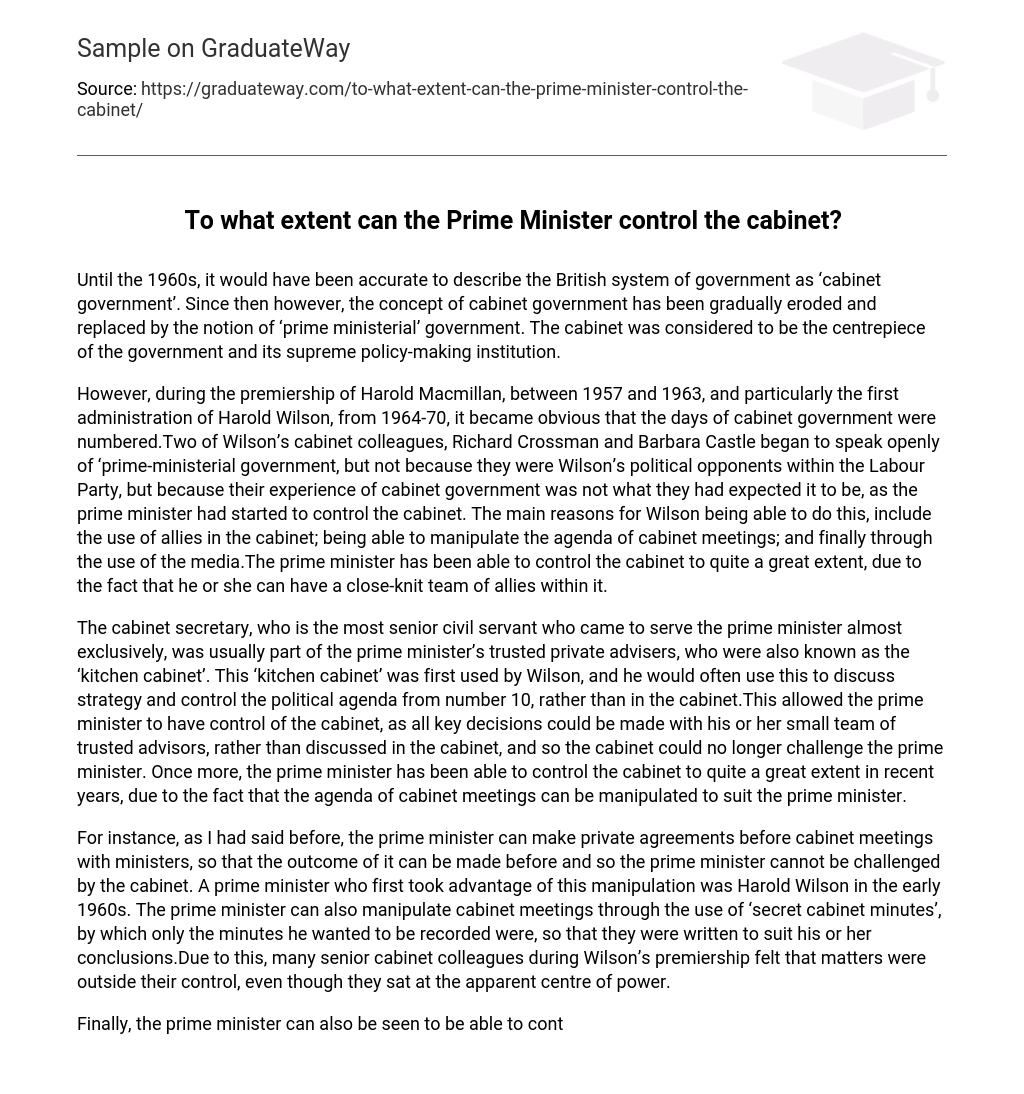Until the 1960s, it would have been accurate to describe the British system of government as ‘cabinet government’. Since then however, the concept of cabinet government has been gradually eroded and replaced by the notion of ‘prime ministerial’ government. The cabinet was considered to be the centrepiece of the government and its supreme policy-making institution.
However, during the premiership of Harold Macmillan, between 1957 and 1963, and particularly the first administration of Harold Wilson, from 1964-70, it became obvious that the days of cabinet government were numbered.Two of Wilson’s cabinet colleagues, Richard Crossman and Barbara Castle began to speak openly of ‘prime-ministerial government, but not because they were Wilson’s political opponents within the Labour Party, but because their experience of cabinet government was not what they had expected it to be, as the prime minister had started to control the cabinet. The main reasons for Wilson being able to do this, include the use of allies in the cabinet; being able to manipulate the agenda of cabinet meetings; and finally through the use of the media.The prime minister has been able to control the cabinet to quite a great extent, due to the fact that he or she can have a close-knit team of allies within it.
The cabinet secretary, who is the most senior civil servant who came to serve the prime minister almost exclusively, was usually part of the prime minister’s trusted private advisers, who were also known as the ‘kitchen cabinet’. This ‘kitchen cabinet’ was first used by Wilson, and he would often use this to discuss strategy and control the political agenda from number 10, rather than in the cabinet.This allowed the prime minister to have control of the cabinet, as all key decisions could be made with his or her small team of trusted advisors, rather than discussed in the cabinet, and so the cabinet could no longer challenge the prime minister. Once more, the prime minister has been able to control the cabinet to quite a great extent in recent years, due to the fact that the agenda of cabinet meetings can be manipulated to suit the prime minister.
For instance, as I had said before, the prime minister can make private agreements before cabinet meetings with ministers, so that the outcome of it can be made before and so the prime minister cannot be challenged by the cabinet. A prime minister who first took advantage of this manipulation was Harold Wilson in the early 1960s. The prime minister can also manipulate cabinet meetings through the use of ‘secret cabinet minutes’, by which only the minutes he wanted to be recorded were, so that they were written to suit his or her conclusions.Due to this, many senior cabinet colleagues during Wilson’s premiership felt that matters were outside their control, even though they sat at the apparent centre of power.
Finally, the prime minister can also be seen to be able to control the cabinet, due to the fact that they have the responsibility for the composition of the cabinet. The prime mister has the power to hire, fire and reshuffle cabinet members and they can make or break their political careers.The prime minister can exploit this power to control the cabinet, by appointing their strongest allies to key positions within the cabinet, so that they are more likely to get the decisions that they want. Margaret Thatcher is a great example of where a prime minster has used their power to reshuffle the cabinet to strengthen their power.
By 1983, Thatcher had removed most of her political opponents from the government. The cabinet seemed to operate as it had always done but it was packed with her supporters and she controlled its meetings just like Wilson did.Effectively she was now able to do what she wanted in the government. However, you could argue that a prime minister’s ability to control the cabinet solely depends on how much the support that that prime minister has.
For instance, Gordon Brown could never dominate the cabinet like his predecessor Blair had done. Straight from the off he was hampered by a lack of media and public support as well as a gap in his legitimacy as a prime minister, as he had never faced the electorate in a general election as party leader. He was therefore commonly described as an ‘unelected’ prime minster.Although he did exercise a high level of control over international affairs, he never showed great control in the cabinet, as he was never strongly supported by members of his own party.
An example of when this has been the case, is when David Miliband wrote an article in The Guardian newspaper on the 30th July 2010 which greatly undermined the work that Gordon Brown had done as prime minister. Such examples, like the one before of when Gordon Brown’s leadership had been questioned, shows that not every prime minster can control the cabinet.To conclude, it is indeed the case that prime ministers do have the ability to control the cabinet to quite a great extent, as the ability to compose the cabinet means they can have their strongest supporters within it; they can manipulate cabinet meetings and minutes so that they can control what is discussed and the conclusions that come out of them; and finally the use of a close-knit group of advisers mean that agreements can be made before cabinet meetings and so the outcome of discussions can be pre-determined.However, this ability to control the cabinet solely depends on how much support that the prime minster has, as we have already seen that if you do not have the support then you will not be able to control the cabinet.





